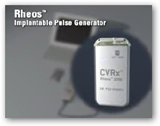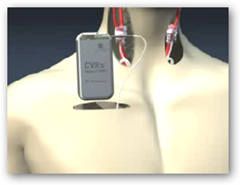The surgery and the cost of the device itself would be around $20,000 and the study was to determine of using a device versus drugs would be cost effective. The study patients that participated were those with drug resistant blood pressure control issues at stage 2. The device called a Rheos, lowers  blood pressure by 30 to 35mm Hg. It is approved for use in Europe but not yet in the US.
blood pressure by 30 to 35mm Hg. It is approved for use in Europe but not yet in the US.
In addition other studies are on going for the use with congestive heart failure patients. Surgery takes 2- 3 hours, 2 incisions are made in the neck to place the device and requires a short stay in the hospital. We are getting more implants available today for sure, so gee I could have a defibrillator , an implant for depression, and so on, so I guess that wireless power device they are working on to power multiple devices should get here soon (grin). BD
A study conducted by the University of Rochester Medical Center demonstrates that, for certain patient populations, an experimental device that lowers blood pressure may be a cost effective treatment. The implantable device, called Rheos, is in advanced stages of testing for individuals with drug resistant hypertension.
The Rheos High Blood Pressure or Hypertension Therapy System - which is being developed by CVRx, Inc. of Minneapolis - consists of a battery-powered implantable generator, which is inserted under the skin near the collarbone, and two carotid sinus leads, which run from the generator to the left and right carotid sinus in the neck.
The device activates the carotid baroreceptors - a key regulator of the body's cardiovascular system - which prompts signals that are interpreted by the brain as a rise in blood pressure. The brain then works to counteract this perceived rise in blood pressure by sending signals to other parts of the body that relax the blood vessels and inhibit the production of stress-related hormones. These changes enable the heart to increase blood output, while maintaining or reducing its workload, thereby reducing blood pressure when it is elevated and alleviating the symptoms of heart failure.
Rheos is currently undergoing Phase III clinical trials at sites throughout the U.S., including Rochester where physicians were the first in the nation to implant the device back in 2005. The device is also being used in a newer study which is evaluating its utility in treating patients with congestive heart failure.
Cost effectiveness of blood pressure device evaluated




